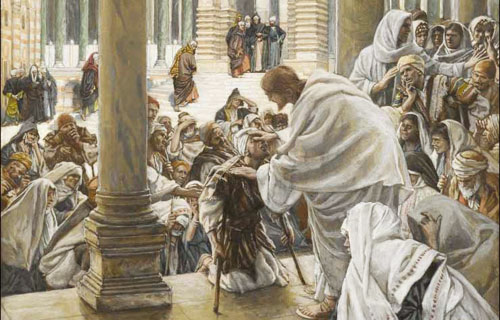 The disciples of John reported all these things to him. And John, calling two of his disciples to him, sent them to the Lord, saying, “Are you the one who is to come, or shall we look for another?” And when the men had come to him, they said, “John the Baptist has sent us to you, saying, ‘Are you the one who is to come, or shall we look for another?’” In that hour he healed many people of diseases and plagues and evil spirits, and on many who were blind he bestowed sight. And he answered them, “Go and tell John what you have seen and heard: the blind receive their sight, the lame walk, lepers are cleansed, and the deaf hear, the dead are raised up, the poor have good news preached to them. And blessed is the one who is not offended by me.”
The disciples of John reported all these things to him. And John, calling two of his disciples to him, sent them to the Lord, saying, “Are you the one who is to come, or shall we look for another?” And when the men had come to him, they said, “John the Baptist has sent us to you, saying, ‘Are you the one who is to come, or shall we look for another?’” In that hour he healed many people of diseases and plagues and evil spirits, and on many who were blind he bestowed sight. And he answered them, “Go and tell John what you have seen and heard: the blind receive their sight, the lame walk, lepers are cleansed, and the deaf hear, the dead are raised up, the poor have good news preached to them. And blessed is the one who is not offended by me.”When John's messengers had gone, Jesus began to speak to the crowds concerning John: “What did you go out into the wilderness to see? A reed shaken by the wind? What then did you go out to see? A man dressed in soft clothing? Behold, those who are dressed in splendid clothing and live in luxury are in kings' courts. What then did you go out to see? A prophet? Yes, I tell you, and more than a prophet. This is he of whom it is written,
“‘Behold, I send my messenger before your face,
who will prepare your way before you.’
I tell you, among those born of women none is greater than John. Yet the one who is least in the kingdom of God is greater than he.” (When all the people heard this, and the tax collectors too, they declared God just, having been baptized with the baptism of John, but the Pharisees and the lawyers rejected the purpose of God for themselves, not having been baptized by him.)
“To what then shall I compare the people of this generation, and what are they like? They are like children sitting in the marketplace and calling to one another,
“‘We played the flute for you, and you did not dance;
we sang a dirge, and you did not weep.’
For John the Baptist has come eating no bread and drinking no wine, and you say, ‘He has a demon.’ The Son of Man has come eating and drinking, and you say, ‘Look at him! A glutton and a drunkard, a friend of tax collectors and sinners!’ Yet wisdom is justified by all her children.”
You can hardly blame John. After a lifetime of devotion to God, he was arrested for his righteous judgment of Herod. Things had not worked out the way he imagined. After pointing out Jesus as the Messiah no kingdom had come for the Jews. Nothing was changing... or so it seemed. He sent his disciples to ask Jesus point blank if he was the Messiah. Perhaps John feared his entire life's work had been in vain.
Rather than giving them an answer that could be used against him either way by his opponents, Jesus spends an hour healing diseases, casting out demons, restoring sight to the blind, and preaching the good news to the poor - clear fulfillment of Messianic prophecies. John would understand the report loud and clear. Jesus might not be exactly the Messiah he had imagined, but the kingdom of God was at hand nevertheless.
Jesus commends John to the level of the greatest prophet ever, in fact the one who would come in the spirit of Elijah to prepare the way for the Christ. But the others in the generation who reject John and Jesus are compared to pouting sulking children who refuse to dance at times of joy or cry at times of mourning. They simply miss the point and the celebration. He calls out the Pharisees on their inconsistencies and hypocrisy. They judged John for his extreme fasting - attributing his unusual behavior to demonic possession. When Jesus came feasting they judged him as well. The Message puts it this way: "John the Baptist came fasting and you called him crazy. The Son of Man came feasting and you called him a lush. Opinion polls don't account for much, do they?" Neither man played by the Pharisees' rules, so they would rather take their ball and go home. Some people will just never be happy.
Are there inconsistencies in our words and actions when it comes to our faith? Do we judge people rather than carefully seeking the truth of a situation? We must be vigilant to guard against falling into ruts in our beliefs rather than searching Scripture and seeking the leading of the Holy Spirit. True wisdom will be proved by the fruit borne by following it.
The fear of the LORD is the beginning of knowledge, but fools despise wisdom and discipline.
- Proverbs 1:7

No comments:
Post a Comment